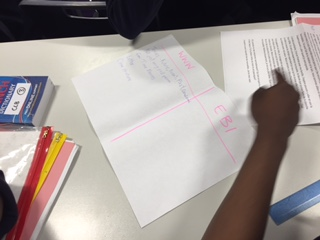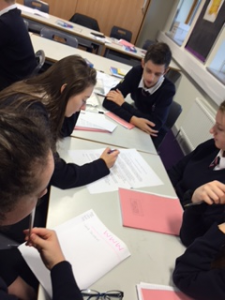Critiquing To Achieve the Very Best Grades
Written By Claire Beaumont
Last week my Year 11 students started preparation for a piece of French controlled assessment. Following the recent AGS Inspire session I realised that using critique could be the key to students understanding what it takes to achieve and A*/A on a piece of writing.
So I got hold of two pieces of work written by older students who had achieved A/A* marks, typed them up to anonymise them and blew them up onto A3. After splitting the class into four groups, mixed ability in each, we began with a discussion about critique: what was it? What were they looking for? Why do it? With some targeted questioning and throwing some ideas around, students were able to identify specific elements to look for. These included a wide range of vocabulary, complex structures, idioms, how ideas are developed and explained, tenses used with a high level of accuracy. The students spent about 10 minutes on each text, highlighting and commenting on elements which they believed had gained the most marks. When they swapped to a different text, they were able to read whet the previous group had found and build upon it.
After more questioning and sharing of findings the students then made a list of structures or elements they could weave into their own work.
What the students said:
“I thought it was good because it shows us how to get a higher grade and aim for A to A*” (Isabella)
“It was useful because I now know what to include when I am writing” (Katie)
“It taught me what I need to know to get a good grade. It was fantastic.” (Yousuf)
To sum up, using critique made it easy to deliver an engaging lesson, to get everyone talking in a comfortable environment and pick up ideas from each other. The fact that the work critiqued belonged to Acklam Grange students gave the students more confidence.
Would I recommend it? Definitely. As a tool for independent learning, collaboration and deeper thinking it almost looks after itself, just make sure that you provide the students with the background, questions or scaffolding they need, so they understand exactly what they are looking for and why.
Written By Claire Beaumont





